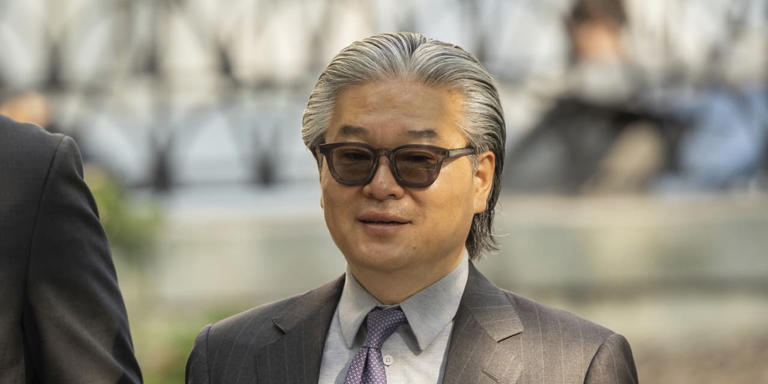The founder of Archegos Capital Management, Bill Hwang, faced a significant legal defeat on Wednesday when he was convicted of securities and market manipulation fraud. This high-profile case, which drew considerable attention from both the financial industry and the public, underscored the extensive repercussions of Hwang’s actions, which prosecutors argued led to substantial losses for global investment banks.
Overview of the Case
Bill Hwang, who once stood at the helm of Archegos Capital Management, a hedge fund that collapsed in 2021, was found guilty on multiple counts of fraud and market manipulation. The jury convicted him on 10 criminal counts, including six charges of market manipulation, while acquitting him on one count. Throughout the trial, Hwang maintained a stoic demeanor, although he appeared visibly tense, taking several sips of water as the verdict was announced.
Prosecution’s Argument
Federal prosecutors in New York laid out a detailed case against Hwang, portraying him as the mastermind behind a scheme to artificially inflate the values of nearly a dozen stocks. According to the prosecution, this manipulation resulted in a catastrophic collapse that erased $100 billion in market value, leading to the downfall of Archegos Capital Management.
Assistant U.S. Attorney Alexandra Rothman argued that Hwang’s ambition to become a legendary figure on Wall Street drove him to engage in deceptive practices. She explained that Hwang used stock derivatives to covertly amass large positions in a few select companies. By doing so, he managed to avoid public disclosure requirements, which allowed Archegos to dominate trading and stock ownership without attracting regulatory attention. At one point, Archegos secretly controlled over 50% of the shares of ViacomCBS, a significant revelation that highlighted the extent of the manipulation.
The prosecution further accused Hwang of deceiving banks to secure billions of dollars in loans. These loans were instrumental in expanding Archegos’ investment portfolio from $10 billion to an astonishing $160 billion. However, this strategy left the firm’s portfolio highly susceptible to price fluctuations in the stocks it controlled, ultimately leading to its dramatic collapse.
Defense’s Counterargument
Hwang’s defense attorney, Barry Berke, presented a contrasting narrative, portraying his client as an honest and principled investor. Berke argued that Hwang genuinely believed in the stocks he invested in and did not mislead any banks about his business practices. He emphasized that Hwang did not lead the extravagant lifestyle typical of billionaires, suggesting that his actions were driven by a genuine investment strategy rather than greed.
In his closing arguments, Berke reiterated that Hwang’s significant investments in certain stocks were based on his firm belief in their potential. He stated, “Mr. Hwang bet big on stocks he believed in. That is not a crime,” urging the jury to view Hwang’s actions as part of a legitimate investment strategy rather than fraudulent manipulation.
The Collapse of Archegos
The indictment provided a comprehensive account of how Archegos’ lack of transparency contributed to its downfall. By using securities that did not require public disclosure, Archegos was able to secretly control substantial shares of multiple companies. This lack of transparency meant that the broader market was unaware of the risks posed by Archegos’ concentrated positions. When the firm’s heavily leveraged bets started to unravel in late March 2021, margin calls triggered a massive sell-off. This sell-off led to a loss of more than $100 billion in market value over just a few days, affecting numerous companies and financial institutions.
Financial Impact and Market Response
The ripple effects of Archegos’ collapse were profound, impacting nearly a dozen companies and resulting in significant losses for banks and prime brokers who had been misled by Archegos’ practices. The financial institutions involved suffered billions of dollars in losses, prompting a broader discussion about the risks associated with opaque trading strategies and the need for greater regulatory oversight.
Co-conspirator’s Conviction
In addition to Hwang’s conviction, the jury also found Patrick Halligan, the former financial officer of Archegos Capital Management, guilty. This conviction highlighted the extent of the fraudulent activities within the firm and underscored the collaborative nature of the scheme. Halligan’s involvement further illustrated the systemic issues within Archegos that contributed to its eventual collapse.
Broader Implications
Bill Hwang’s conviction marks a significant moment in the ongoing effort to regulate and enforce ethical standards within the financial industry. The case serves as a stark reminder of the potential consequences of market manipulation and the importance of transparency and honesty in financial dealings. It also highlights the risks associated with highly speculative investment strategies that lack adequate oversight and disclosure.
The outcome of this case is likely to prompt increased scrutiny of hedge funds and other financial institutions, as regulators and policymakers seek to prevent similar incidents in the future. For the financial industry, Hwang’s conviction underscores the need for robust risk management practices and greater transparency in investment activities.
In conclusion, the conviction of Bill Hwang and the collapse of Archegos Capital Management serve as a cautionary tale about the dangers of unchecked ambition and deceptive practices in the financial industry. The case highlights the critical importance of regulatory oversight and ethical conduct in maintaining the stability and integrity of financial markets.
